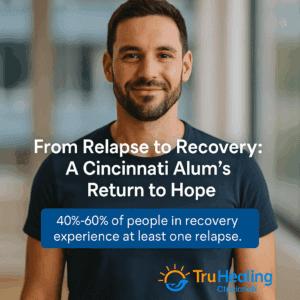For some, relapse feels like the end. For us at TruHealing Cincinnati, it’s often the beginning of a deeper recovery.
One of our local alumni—we’ll call him Jordan—had over 90 days sober. He’d done the work, reconnected with his family, and even picked up old hobbies. But addiction doesn’t let go easy. One unexpected trigger, one overwhelming day, and Jordan was using again. He called us within 24 hours.
What followed wasn’t shame—it was a return. Through our medical detox program and IOP in Cincinnati, Jordan didn’t just recover again. He found something stronger than his first try: a recovery rooted in resilience, not just resolve.
Why Relapse Doesn’t Mean Starting Over
There’s a lie a lot of people believe: that relapse erases everything you’ve built. But it doesn’t. Your body might feel like it’s back at square one—but your mind, your heart, your insight? Those don’t vanish.
Jordan still remembered the coping tools from IOP. He still had numbers saved from alumni meetings. And most importantly, he still had the truth: healing is still possible.
Relapse isn’t a failure. It’s feedback. And it brought Jordan back through our doors, where he was met with compassion—not judgment.
The Power of a Safe, Medical Detox
Detoxing alone is dangerous—and after a relapse, it’s often more complicated than the first time.
At our Cincinnati-based medical detox program, Jordan received 24/7 care that helped him safely manage withdrawal and stabilize physically. More than just supervision, detox here meant kindness. Nurses who sat with him when he couldn’t sleep. Staff who remembered his name. A treatment plan built on what had worked—and what hadn’t.
This wasn’t about “fixing” him. It was about supporting his return with the dignity he deserved.
Our medical detox services are designed to reduce risk, manage discomfort, and prepare clients for the next step. Whether it’s your first detox or you’re returning after a setback, our medical team meets you where you are—with no judgment, just care.
Rebuilding Trust Through IOP Support
Once medically cleared, Jordan reentered our Intensive Outpatient Program (IOP). This time, he knew what to expect. But what surprised him most was how different it felt.
He wasn’t the new guy anymore. He spoke up more. He admitted where he’d held back last time. And this time, he asked for help when he needed it—not after the fact.
Group sessions dug deeper. His individual therapist helped him identify blind spots that were missed the first time around. He learned that recovery isn’t about doing it perfectly. It’s about being willing to come back, again and again, if needed.
This kind of transformation happens when shame is replaced with support. Our IOP offers structure, flexibility, and a community of peers who get it. And when you walk back in after a relapse, you’re not seen as someone who failed. You’re seen as someone who’s trying again—and that matters.

Why Some Alumni Come Back Stronger
Relapse doesn’t negate your progress. For many alumni, it brings a new level of honesty. A willingness to ask harder questions. A deeper desire to stay connected, not just compliant.
Jordan discovered that recovery isn’t linear. It’s layered. He said, “I didn’t think they’d take me seriously the second time. But they did. Maybe even more.”
If you’re an alum who’s slipped, you might be carrying guilt. You might feel like you can’t face the same group or therapist again. But at TruHealing Cincinnati, we understand relapse isn’t a personal failure. It’s part of a condition that takes time, effort, and community to heal from.
Every day you choose recovery again, you’re making progress—even if it looks different than before.
What to Expect When You Come Back
Returning after a relapse may feel scary. But here’s what it actually looks like at TruHealing:
- Warm Welcome: You won’t be grilled or judged. You’ll be asked, “What do you need right now?”
- Updated Plan: We’ll review what worked and where things got shaky. Your plan will be adapted.
- Team Support: From detox to IOP and aftercare, you’ll have a team who believes in your comeback.
- Peer Connection: You’re not the only one who’s been here. Many of our strongest alumni are people who came back and stayed.
You’re never disqualified from recovery. You’re never too far gone to return. And you’re never alone in the process.
Ready to Reconnect With Recovery?
If it’s been 90 days or 9 months since your last sober day—if shame is telling you not to call—know this: you are still welcome here. We see your courage, not your setback.
Visit our medical detox program in Cincinnati to learn how we can support your return. Or call us directly at (513) 643-9117. You don’t have to start over. You just have to start again.
Frequently Asked Questions (FAQ)
Is it normal to relapse after months of sobriety?
Yes. While not inevitable, relapse is a common part of the recovery process for many people. It doesn’t erase your progress and doesn’t mean you’ve failed.
What is a medical detox program?
A medical detox program provides 24/7 medical supervision during withdrawal to ensure safety, manage symptoms, and prepare you for ongoing treatment.
Can I come back to TruHealing Cincinnati after a relapse?
Absolutely. We welcome alumni who need support after a relapse. There is no shame here—just a team ready to help you reconnect with your recovery.
Will I be judged if I return?
No. At TruHealing, we understand that relapse happens. Our staff is trained to meet you with compassion, not criticism.
What should I do if I’m scared to return?
You’re not alone. Fear is common, but don’t let it silence you. You can start by calling us or exploring our detox and IOP options online. Even reading this blog is a step.
How do I know if I need detox again?
If you’ve returned to regular use or experienced withdrawal symptoms, a medical detox can help you safely reset. Our team can help assess what level of care is right for you.

